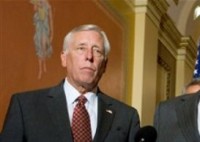By Jim Efstathiou Jr., Bloomberg
Barack Obama will classify carbon dioxide as a dangerous pollutant that can be regulated should he win the presidential election on Nov. 4, opening the way for new rules on greenhouse gas emissions.
The Democratic senator from Illinois will tell the Environmental Protection Agency that it may use the 1990 Clean Air Act to set emissions limits on power plants and manufacturers, his energy adviser, Jason Grumet, said in an interview. President George W. Bush declined to curb CO2 emissions under the law even after the Supreme Court ruled in 2007 that the government may do so.
If elected, Obama would be the first president to group emissions blamed for global warming into a category of pollutants that includes lead and carbon monoxide. Obama’s rival in the presidential race, Republican Senator John McCain of Arizona, has not said how he would treat CO2 under the act.
The president may take action on new rules immediately upon taking office, said David Bookbinder, chief climate counsel for the Sierra Club. Environment groups including the Sierra Club and Natural Resources Defense Council will issue a regulatory agenda for the next president that calls for limits on CO2 from industry. “This is what they should do to hit the ground running,’’ Bookbinder said in an Oct. 10 telephone interview.
An Obama victory would help clear the deadlock in talks on an international agreement to slow global warming, Rajendra Pachauri, head of a United Nation panel of climate-change scientists, said today in Berlin. Negotiators from almost 200 countries will meet in December in Poznan, Poland, to discuss ways to limit CO2.
“The U.S. has to move quickly domestically so we can get back in the game internationally,’’ Grumet said. “We cannot have a meaningful impact in the international discussion until we develop a meaningful domestic consensus. So he’ll move quickly.’’
McCain hasn’t said how he would approach CO2 regulation under the Clean Air Act. McCain adviser and former Central Intelligence Agency director James Woolsey said Oct. 6 that new rules may conflict with Congressional efforts. Policy adviser Rebecca Jensen Tallent said in August that McCain prefers a bill debated by Congress rather than regulations “established through one agency where one secretary is getting to make a lot of decisions.’’ “He is not as big of a fan of standards-based approaches,’’ Arroyo said. Read more of the next potentially devastatingly costly governmental mistake here.
Icecap Note: in the debate last night notice how Obama would only go as far as to say as president he would look at offshore drilling. That is because Pelosi and Reid are already strategizing how they will reenact the ban on offshore drilling after the democrats sweep on the upcoming election as they expect. As usual they are not looking at the experiences elsewhere globally where Kyoto like regulations or restrictions or carbon taxes were imposed. See in the story below how these countries and their citizens are moving away from the failed green agenda. As I noted before, I am all for conservation and innovation and for an “all of the above” solution for our energy needs including natural gas, offshore drilling, ANWR drilling, oil shale and tar sand extraction, clean coal and coal gasification and liquification, hydropower, tidal, geothermal, synfuels and where it makes sense wind and solar. Not only because we want to become energy independent but because we are going to need all the enrgy we can find or create as the earth continues to cool.
By Josiah Ryan, Staff Writer CNS News
CNSNews.com is reporting that House Majority Leader Steny Hoyer (D-MD) has said that restoring the ban on new offshore oil drilling leases “will be a top priority for discussion next year” if the Democrats retain control of Congress. The congressional Democratic leadership decided this week not to try to extend the ban, which they might have attempted by including it in the continuing resolution that passed the House today in order to keep the government funded past the end of the fiscal year, which comes to a close on September 30.

The existing ban on selling new offshore oil drilling leases is part of the fiscal 2008 Interior Department appropriation. When that appropriation expires on September 30, so does the drilling ban. “I am sure it will be a top priority for discussion next year,” Hoyer said when CNSNews.com asked him if Democrats would fight to restore the ban.
CNSNews.com reported on Monday that congressional Democrats were considering allowing the ban to expire in the hopes that they could restore it next year with a stronger majority in Congress or a president in the White House.
Republicans also warned that the fight is not over, and predicted that Democrats would try to restore the ban. “Oh yes,” Sen. James Inhofe (R-Okla.) told CNSNews.com when asked if he expected Democrats to attempt to restore the ban. “I would expect them to try to restore the moratoria but that’s why its so important to get the word out to the American people that, yes, this is a great thing, but it makes it so much worse for Democrats if the people of America find out that they are doing this only to get by in the elections then turn around and cut off the supply.”
CNSNews.com reported on Monday that congressional Democrats were considering allowing the ban to expire in the hopes that they could restore it next year with a stronger majority in Congress or a president in the White House.


